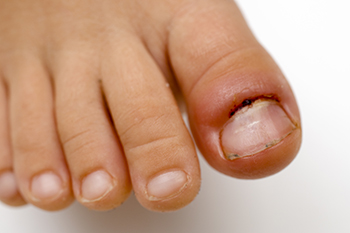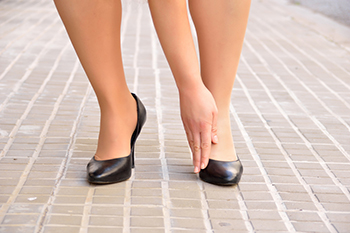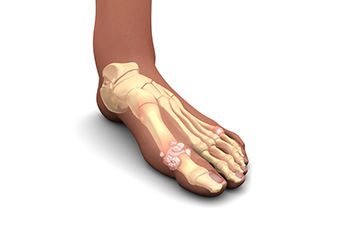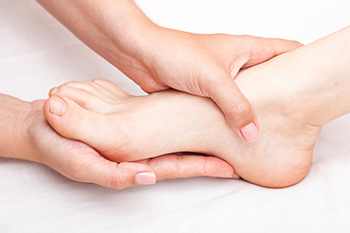
(908) 381-8160Berkeley Heights

Having an abscess on the toe can be a painful and annoying experience. A toe abscess may be caused by germs or oil in the toe, a hair follicle, or a skin puncture. An abscess is a sign of infection causing the sore to fill with pus and other fluids. Inflammation sets in, and the toe becomes red and painful to the touch. Ignoring a toe abscess can lead to more serious infections within the entire body. Before a podiatrist can treat an abscess, certain information is needed, including how long the abscess has been there and whether the toe was injured. If the abscess is advanced, the podiatrist will proceed to make a small cut to drain it, and then will flush the area with an antiseptic solution. A bandage will be applied to guard against further infection, and pain medication may be prescribed. One way to prevent another toe abscess is to maintain daily foot hygiene habits. For more information on wound care for a toe abscess, it is suggested that you make an appointment with a podiatrist.
Wound care is an important part in dealing with diabetes. If you have diabetes and a foot wound or would like more information about wound care for diabetics, consult with Dr. Janet Leicht from New Jersey. Our doctor will assess your condition and provide you with quality foot and ankle treatment.
What Is Wound Care?
Wound care is the practice of taking proper care of a wound. This can range from the smallest to the largest of wounds. While everyone can benefit from proper wound care, it is much more important for diabetics. Diabetics often suffer from poor blood circulation which causes wounds to heal much slower than they would in a non-diabetic.
What Is the Importance of Wound Care?
While it may not seem apparent with small ulcers on the foot, for diabetics, any size ulcer can become infected. Diabetics often also suffer from neuropathy, or nerve loss. This means they might not even feel when they have an ulcer on their foot. If the wound becomes severely infected, amputation may be necessary. Therefore, it is of the upmost importance to properly care for any and all foot wounds.
How to Care for Wounds
The best way to care for foot wounds is to prevent them. For diabetics, this means daily inspections of the feet for any signs of abnormalities or ulcers. It is also recommended to see a podiatrist several times a year for a foot inspection. If you do have an ulcer, run the wound under water to clear dirt from the wound; then apply antibiotic ointment to the wound and cover with a bandage. Bandages should be changed daily and keeping pressure off the wound is smart. It is advised to see a podiatrist, who can keep an eye on it.
If you have any questions, please feel free to contact our office located in Berkeley Heights, NJ . We offer the newest diagnostic and treatment technologies for all your foot care needs.

A common foot condition that can develop from frequently wearing high heels is ingrown toenails. Despite the pain and discomfort this ailment can cause, many women continue to wear this type of shoe and choose to suffer through the pain. When these types of shoes are worn, pressure can be exerted on the toes, possibly preventing the toenails from growing properly. Additionally, this may cause the nail to puncture the skin, and an infection may ensue. Ingrown toenails may be managed when high heels must be worn by refraining from wearing tight hosiery and soaking the feet in lukewarm water. Patients who have diabetes may need to pay extra attention if they have developed an ingrown toenail. It is beneficial to temporarily stop wearing the high heels that caused the toenail to become ingrown, and an infected ingrown toenail may require minor surgery for relief. If you wear high heels and have developed an ingrown toenail, it is suggested that you confer with a podiatrist who can help you to manage this condition.
High heels have a history of causing foot and ankle problems. If you have any concerns about your feet or ankles, contact Dr. Janet Leicht from New Jersey. Our doctor can provide the care you need to keep you pain-free and on your feet.
Effects of High Heels on the Feet
High heels are popular shoes among women because of their many styles and societal appeal. Despite this, high heels can still cause many health problems if worn too frequently.
Which Parts of My Body Will Be Affected by High Heels?
What Kinds of Foot Problems Can Develop from Wearing High Heels?
How Can I Still Wear High Heels and Maintain Foot Health?
If you want to wear high heeled shoes, make sure that you are not wearing them every day, as this will help prevent long term physical problems. Try wearing thicker heels as opposed to stilettos to distribute weight more evenly across the feet. Always make sure you are wearing the proper shoes for the right occasion, such as sneakers for exercising. If you walk to work, try carrying your heels with you and changing into them once you arrive at work. Adding inserts to your heels can help cushion your feet and absorb shock. Full foot inserts or metatarsal pads are available.
If you have any questions please feel free to contact our office located in Berkeley Heights, NJ . We offer the newest diagnostic and treatment technologies for all your foot and ankle needs.

Anyone is at risk for getting the foot condition that is known as gout, despite it being more prevalent among men. The chances may increase in women after menopause, and it generally does not happen before then. Existing medical conditions may lead to developing gout, including obesity, alcoholism, and high blood pressure. A genetic history may also contribute to getting gout, in addition to eating foods that have high levels of purines. These types of foods consist of red meat, shellfish, and drinks that are made with large amounts of sugar. The purines convert to uric acid in the blood, and excess uric acid turns to crystals which can lodge in the joints of the big toe. This can cause debilitating pain, and it may be so severe it can be difficult to walk up steps. If you have had one or more bouts of gout, it is strongly suggested that you are under the care of a podiatrist who can effectively treat this condition.
Gout is a foot condition that requires certain treatment and care. If you are seeking treatment, contact Dr. Janet Leicht from New Jersey. Our doctor will treat your foot and ankle needs.
What Is Gout?
Gout is a type of arthritis caused by a buildup of uric acid in the bloodstream. It often develops in the foot, especially the big toe area, although it can manifest in other parts of the body as well. Gout can make walking and standing very painful and is especially common in diabetics and the obese.
People typically get gout because of a poor diet. Genetic predisposition is also a factor. The children of parents who have had gout frequently have a chance of developing it themselves.
Gout can easily be identified by redness and inflammation of the big toe and the surrounding areas of the foot. Other symptoms include extreme fatigue, joint pain, and running high fevers. Sometimes corticosteroid drugs can be prescribed to treat gout, but the best way to combat this disease is to get more exercise and eat a better diet.
If you have any questions please feel free to contact our office located in Berkeley Heights, NJ . We offer the newest diagnostic and treatment technologies for all your foot and ankle needs.

The foot condition that is known as tarsal tunnel syndrome is caused by repetitive pressure. The tibial nerve is affected by this ailment and is located inside the tarsal tunnel. There are various reasons why this nerve can become irritated. People who have severely flat feet may have ankle pain, possibly indicating tarsal tunnel syndrome has developed. Additionally, inflammation from medical conditions, such as arthritis or diabetes, may lead to getting tarsal tunnel syndrome. People who are born with certain foot deformities may experience this condition as well and are generally under the care of a podiatrist. Additional symptoms that are associated with tarsal tunnel syndrome can consist of pain in the Achilles tendon area, swollen ankles, or a feeling of warmth when touched. If you have this condition, it is strongly suggested that you consult with a podiatrist who can offer you the correct treatment options.
Tarsal tunnel syndrome can be very uncomfortable to live with. If you are experiencing tarsal tunnel syndrome, contact Dr. Janet Leicht of New Jersey. Our doctor can provide the care you need to keep you pain-free and on your feet.
Tarsal Tunnel Syndrome
Tarsal tunnel syndrome, which can also be called tibial nerve dysfunction, is an uncommon condition of misfiring peripheral nerves in the foot. The tibial nerve is the peripheral nerve in the leg responsible for sensation and movement of the foot and calf muscles. In tarsal tunnel syndrome, the tibial nerve is damaged, causing problems with movement and feeling in the foot of the affected leg.
Common Cause of Tarsal Tunnel Syndrome
The Effects of Tarsal Tunnel Syndrome
A physical exam of the leg can help identify the presence of tarsal tunnel syndrome. Medical tests, such as a nerve biopsy, are also used to diagnose the condition. Patients may receive physical therapy and prescriptive medication. In extreme cases, some may require surgery.
If you have any questions please feel free to contact our office located in Berkeley Heights, NJ . We offer the newest diagnostic and treatment technologies for all your foot and ankle needs.